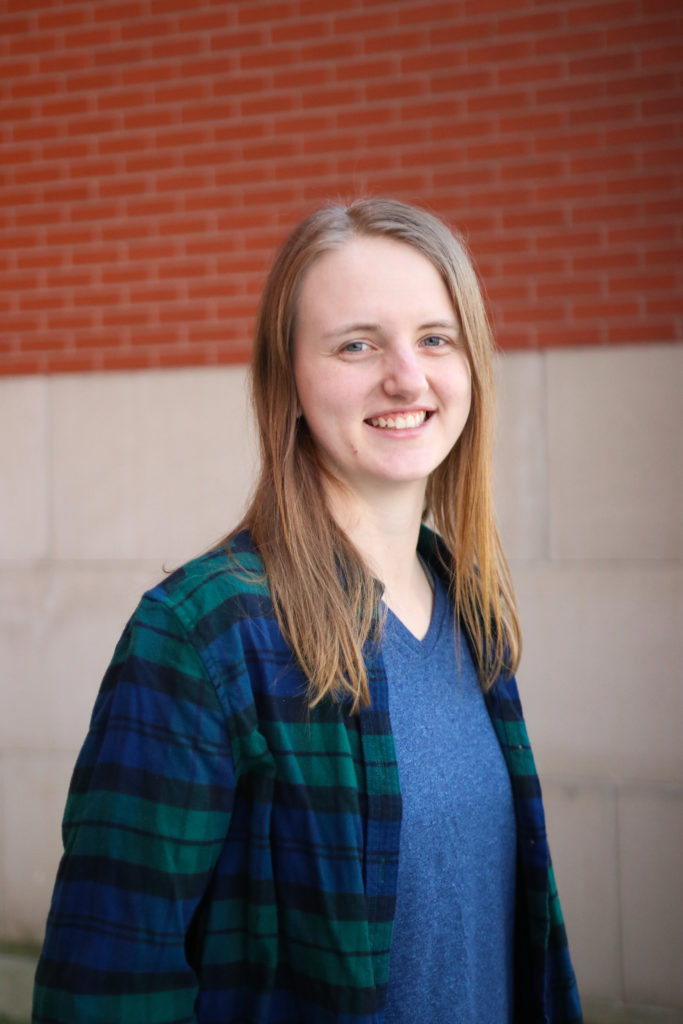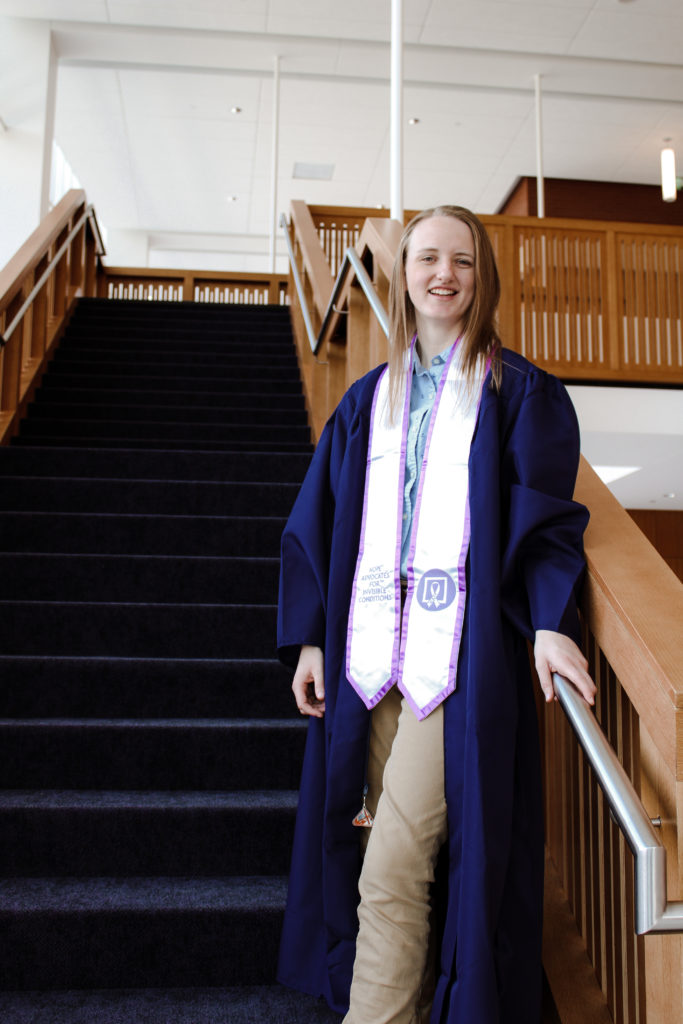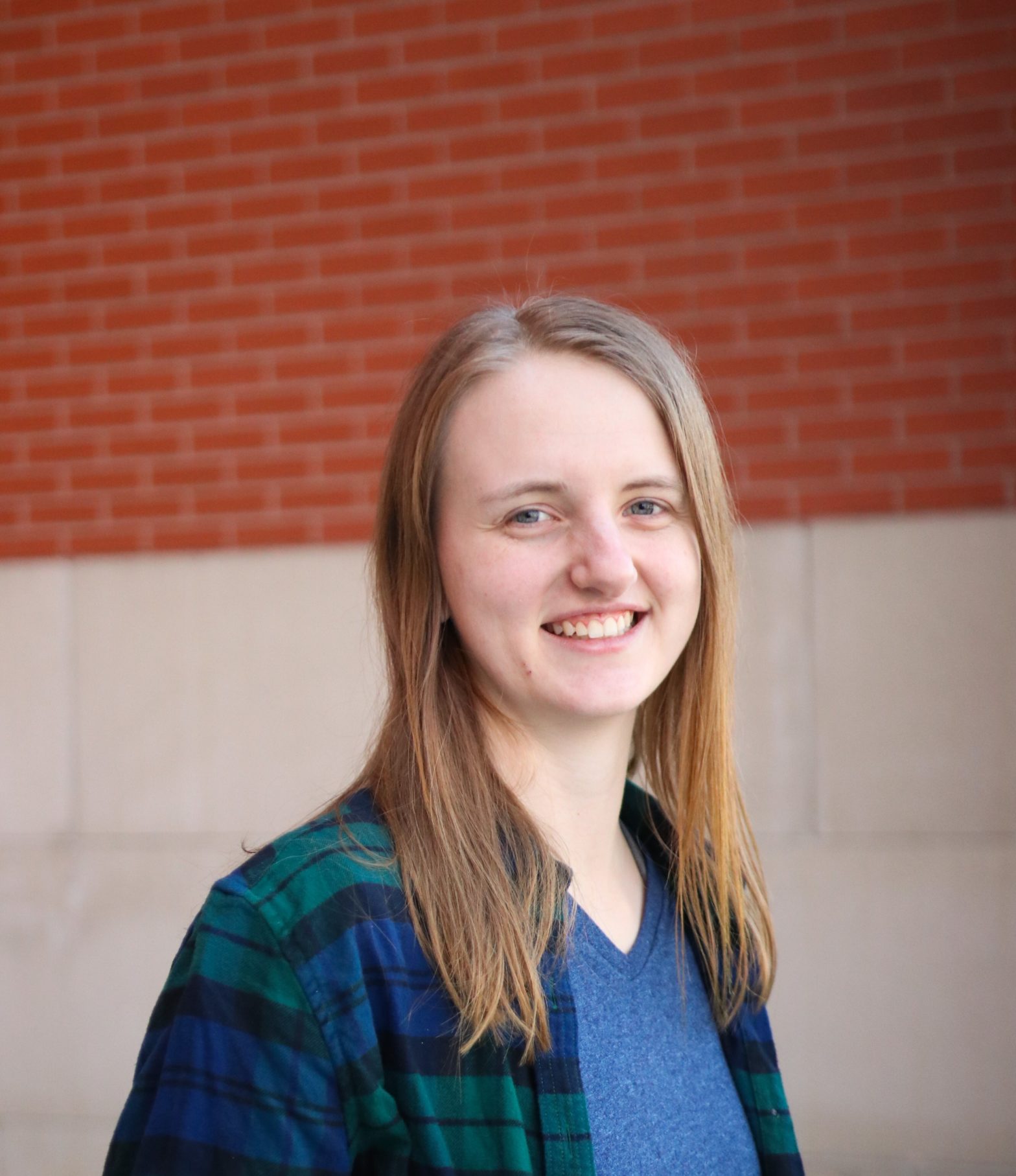The Center for Diversity & Inclusion is pleased to release the My Truth Series. This series contains daily blogs and videos that will be released throughout the week, May 1 through 5, capturing the lived experiences of diverse students at Hope College.
The comments contained in the videos are those of the respective Hope College students and do not necessarily represent the views of Hope College. If you choose to comment, please follow Hope’s Virtues of Public Discourse. Comments that do not follow the Virtues of Public Discourse will be deleted.
Leah is a Class of 2023 Music and Business Double Major. This exceptional senior was involved in: Hope Advocates for Invisible Conditions, TEDxHopeCollege and the Phelps Scholars Program. She will be working in accessibility-related fields and continuing to study music.
Content warning: this talk briefly addresses suicide and violence against marginalized students. This ‘My Truth’ has been censored for content.
My name is Leah Reinardy. I am a white disabled student with golden brown hair that falls just below my shoulders. I am wearing a plaid blue shirt over a blue t-shirt. These words, some of my final words as a Hope student, are my truth. I claim full responsibility for them. However, my truth is not a singular human truth. It contains multitudes, holding pieces of each and every individual that has shaped me from the musicians I share the bandstand with to the marginalized students I fight with, to the women of color in this community who have mentored and empowered me in my work and in my rest.

I am living on borrowed time. That is a truth I hold within me every hour of every day. It means that I must wisely steward this platform just as I have with others of this prominence: with courage, with candor, and with self-compassion. I will make statements that you need to hear but don’t want to hear. I expend this limited energy my body holds to hold you all, the Hope College community accountable. I do so because I care.
If you were to walk up to me on the street without knowing me I would tell you a story of an all too familiar upbringing among the majority of Hope students. I grew up in a suburban neighborhood in Zeeland Michigan in a white upper middle-class family. I have a complex relationship with Zeeland. It is my hometown but it is a community whose embrace has never quite wrapped around me. My mother and all of her siblings went to Hope, so naturally I applied. When I toured Hope, I didn’t fall in love. I ultimately came here for two reasons; it was cheaper than the other schools I applied to and I could continue to see the team of doctors, therapists, and specialists that I already had.
During my first two years at Hope from 2018 to 2020, I studied instrumental music education. As my mind fell apart, as I passed out backstage, as I was in and out of hospitals, members of the Hope community told me that my music, my art, and my writing were beautiful because of my pain. And when I expressed even an ounce of frustration or exhaustion, those words, “If you were really that sick you wouldn’t be here,” would pass through administrators’ lips and rest deep within me. I was to suffer for the art and I was to create this art for others’ consumption.
The person you see in 2023, thankfully, is very different than the person that entered in 2018. I will attribute much of that to the excellent educators, mentors, and friends that have leaned in and challenged me. However, the most transformational experience of my undergrad years was my time away from Hope.
In 2020 I took roughly a year off from my coursework. During that time, I had three surgeries in four months. I lost my abilities to hold a pencil, to type, to walk, and to breathe in ways that I once could, and I lost all of this in the depths of a global pandemic. I struggled to find safe housing and had nights where I just sat in my car in parking lots in Michigan with a sleeping bag and a couple days’ worth of clothes calling folks to see who would take me in.
These experiences forced me to confront who I really was, to stare myself in the face because my identity could no longer be rooted in what I did. These experiences required me to confront my mortality in a way that a liberal arts education could never provide.
Becoming increasingly Disabled and isolated taught me who I could really call community. Many folks got uncomfortable and left, but one Hope student in particular leaned in: Hannah Tegtmeyer, founder of Hope Advocates for Invisible Conditions. At our first coffee, I don’t even think we formally introduced ourselves. I just asked her what her vision was and she laid out two pillars: support and advocacy. HAIC became my stability. It was the only community I could engage with regularly throughout my year away. I didn’t have to explain myself in this space. My peers understood what it was like to have variable health, to fight insurance companies, and to fear for their safety in a society willing to sacrifice Disabled lives for their own comfort.
I have spent a lot of time reflecting with marginalized Hope students on what we’ve learned here. A common mantra emerges, and it is one I will personally claim as well: the number one thing Hope College has taught me is how to fight. And that’s something y’all don’t see behind the blazer and the performances and this pen that I wield to make change.
In December 2021, I became the president of Hope Advocates for Invisible Conditions. At the time, we had a zero-dollar budget and a team of six people. Today, in April 2023, we have a budget in the tens of thousands of dollars, a 10-person executive board, and events whose attendance number in the hundreds. Again, that is the experience you all see. What you don’t see is what my day-to-day looks like.
So let’s go back to that first part of my visual description. I am white.
People come to me because they think I’ll take it easier on them than students of color. I’ll be more palatable.
So let’s go back to that first part of my visual description. I am white.
I want to make it very clear that I am far from the most marginalized student on this campus. This year, I am the only white president of an MSO and I remind myself of that on a daily basis. I do not do so out of guilt; I do so because I cannot leverage privilege that I do not acknowledge.
As an MSO leader I get asked by a lot of people what they can do to promote diversity, equity, and inclusion in their organizations. Sometimes they focus on anti-ableism, other times anti-homophobia or anti-transphobia, but the conversations almost always come back to anti-racism. They call me in because many people want to hear what I dub “the white people do better talk” from me, a white student. People come to me because they think I’ll take it easier on them than students of color. I’ll be more palatable. If they talk to me about race, they don’t have to sit and listen to lived experiences of racial trauma. They won’t have to get uncomfortable but they still get to check that neat little box of having spoken to an MSO president. But when they call me, they don’t get that palatable talk. Instead, they get one message loud and clear: I should not be the diversity in the room. Let me repeat that. I should not be the diversity in the room.
I should not have to remind y’all to include students of color in conversations on supporting the MSOs. And white students doing this work, call it out when you see it. And while you’re at it, make them do their homework. Assign them to watch four to five of these My Truth speeches and find the common threads they see between them.
But the most important thing I need you to know about my day-to-day experience as president of an MSO is that I am traumatized daily by this institution and the systems within it.
I watched COVID protocols lift in Spring 2022, endangering immunocompromised students, staff, and faculty. These protocols were lifted before any accessible infrastructure was put in place. Students called and texted me because they could no longer safely access the dining halls or community spaces they were once protected in. In response, I coordinated student volunteers to run to-go meals to students who couldn’t safely enter Phelps. This underground system I created was in place for a week before a safe meal pickup option was implemented by the College.
I watched my queer friends, trans friends, Disabled friends, and friends of color get targeted and hate-crimed. I helped them construct their reports, attempting to provide them with language that will never do their lived experiences justice. Typical follow-up meetings for reports of this nature occur three to five days after this report is submitted. But marginalized students in the immediate aftermath of targeted attacks care more about our safety and our well-being. When follow-up meetings with staff are only discussions around the reporting process, we feel like data points. Referrals to Campus Safety are well-intentioned but neglect the distrust and trauma marginalized students often have around law enforcement. Walking buddy systems (like we implemented during the 2020 election) seem to be a path forward here in terms of physical safety. However, the only people processing all of what we’ve experienced with us at the moment are the faculty and staff that share our identities, and whether they admit it or not, they’re burnt out too.
This underground system I created was in place for a week before a safe meal pickup option was implemented by the college.
And perhaps the most terrifying part of my daily experience: I have stopped more student suicides in the past two years than I can count on one hand. I have sat on the floors of dorm rooms with students in their lowest moments. I have successfully convinced Campus Safety to trust me and let me guide the conversations we have with students in crisis who distrust them. I have sat with many students in the mental health ER through the night because institutionalization is a terrifying and dehumanizing experience.
Coalition building is critical to this work and it is that interdependence that keeps me alive and fighting.
I have reached out to various staff and campus offices for support in these situations only to be shamed first.
“Why isn’t the student in crisis the one communicating?”
“Why are you even involved in this?”
“Why didn’t you speak up sooner?”
And as for the students in crisis, they’re not getting timely support or follow-up after these, either. If they get follow-up, it takes place days after. Our systems of crisis response at Hope College desperately need overhauling. What’s it gonna take for people to realize that?
When I share many of these experiences with staff and administrators, I am called resilient. That word feels like a dagger when it comes from the mouth of someone who is not in the trenches with you day to day. That word – resilience – acknowledges the weight I carry without doing a thing to lift it off from my shoulders.
But I’m incredibly grateful for the faculty and staff that have helped me carry the weight, or at least given me permission to set it down for an hour or two. They have taken the time to open their ears, their office doors, and their homes to me. They have provided me the space to rest, to eat, to process, and to grieve. They have acknowledged that they wish there was more that they could do to change systems, and I wish there was too. Still, I do not have the words to express the magnitude of their impact in these seemingly small acts of genuine care.
I also would not have made it to graduation without the solidarity of my fellow MSO leaders. They have kept me fed when I was organizing, kept me housed when I struggled to find housing, and offered their time and energy to help me mobilize resources and people. Coalition building is critical to this work and it is that interdependence that keeps me alive and fighting.
So, at this point I’ve laid a lot of pain on the table. I am not relieved to leave so much of this pain in West Michigan when I leave Hope. In fact, I am terrified that the weight I currently carry will merely be shifted to other students’ shoulders. This shifting of weight will perpetuate until Hope as an institution and the people within it truly become more inclusive. Hope has multiple ideological philosophies: Christianity, passivity, and philanthropy that are actively preventing it from being just that.
Hope College’s official statement on racism begins with three words: “Racism is evil”. It also claims, “It is a Christian imperative to be anti-racist.” To be anti-racist is to actively work to dismantle systems that uphold white supremacy.
As Hope stands, its Christian aspirations directly conflict with this statement. You cannot claim to be anti-racist if you are only focused on fighting racism experienced by cisgender, heterosexual, abled people of color. You must fight with the most marginalized: queer, trans, and Disabled people of color. That is the fundamental concept of Kimberlé Crenshaw’s intersectionality theory, which I happened to pick up through my liberal arts education here. When you do not affirm queer and trans students, when you make studying and working at Hope College inaccessible, you are directly contradicting Hope’s commitments to anti-racism. You do not get to pretend that these systems of oppression do not interlock.
Christianity has so much power on this campus. Many Christian teachings do promote love, empathy and compassion.
But what if the message from Christians on this campus had been “We make spaces accessible for all of our neighbors because Jesus loved everyone!” How might that change our perceptions of interdependence? Christianity’s hold on campus culture uniquely positions it as a potential vehicle to reconcile communities in the future. I see glimmers of it beginning to take shape. But if we want to pursue this avenue, more Christians on this campus will need to explicitly affirm queer, trans, and Disabled students for exactly who they are.
Another big thing Hope focuses on is philanthropy. One of the college’s traditions, Dance Marathon, is centered around fundraising for Disabled and immunocompromised children who are treated at Helen DeVos Children’s Hospital. I also see Hope Forward as a potential step in fighting the classism so prevalent in academia by creating access to college for marginalized students.
But as it stands, philanthropy is our DEI band-aid. Why do we spend countless hours fundraising and planning for Dance Marathon only to turn our backs on protecting those same children when they turn 18, pick up an orange folder, and move into their first dorm room at Hope College? Are we so focused on getting marginalized students in the door through programs like Hope Forward that we stop focusing on protecting them during their four years here? Somewhere along the line we focused on fundraising over fellowship. We stopped sitting on the ground with people at their lowest moments. Maybe we never lowered ourselves to the ground in the first place.
I don’t expect Hope to change these ideological beliefs. Maybe you all work to solve these things, maybe you don’t. I can’t care for you. I can’t make you care. There are plenty of students and alumni who’ve already told you the same things that I’d recommend you do if you really want to lean in and do this work: representation, restructuring, funding, accountability.
People of Hope College, all I ask is this: stop pretending to be something you’re not. Don’t make excuses, don’t push it off for more listening and learning. Our time is finite and your inaction has a cost of human lives. I would know. I see its impact daily.

To marginalized students on this campus: institutions and systems of care have come a long way over the years, but they are still failing you, and I see that. The tragic and beautiful reality is that you must protect and support each other and you must protect and support yourselves. Leverage every ounce of privilege you can to do so, and if you feel you have none remember that you have your education. There are allies here who do care about you; continue to seek them out. And for those of you who find joy and rest in creating art, create it for you from now on.
May we remember why we continue this fight. We aspire to the day when all students can cross that commencement stage and say anchored IN Hope instead of anchored BY Hope.



Leah, thank you for sharing your powerful truth. Your courage and honesty are truly commendable. It’s heartbreaking to hear about the challenges you’ve faced, but your strength in the face of adversity is inspiring. Your advocacy and determination have undoubtedly made a difference in the lives of many, and your call for genuine change is both necessary and urgent. Remember, your voice matters, and your efforts have not gone unnoticed. Wishing you strength and resilience as you continue your journey. Stay strong and keep fighting for a more inclusive future.